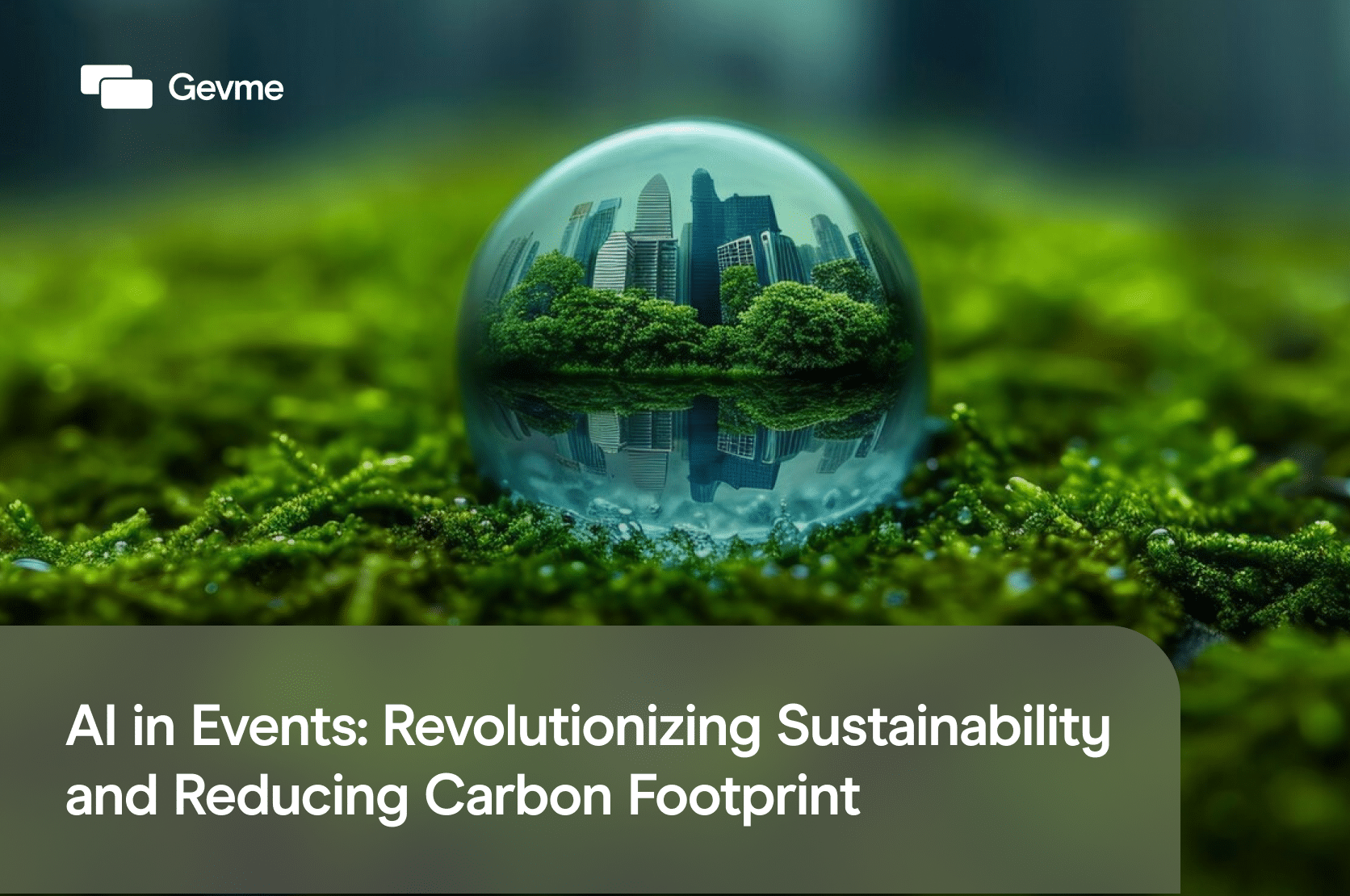AI technology is making big strides in transforming different industries, including the events sector. It is being used in various ways, such as automating tasks and helping with decision-making based on data. This integration of AI in events has caught the attention of many people and offers exciting opportunities for sustainability and reducing our impact on the environment.
What We Will Cover
In this article, we will discuss:
- How AI is driving innovation towards sustainability goals in the events industry
- Real-world examples of AI-powered solutions for sustainable events
- The challenges and ethical considerations associated with leveraging AI technology for event sustainability
Our aim is to provide insights into the potential benefits and complexities of using AI in creating a more environmentally friendly and efficient future for the events industry.
The Importance of Sustainable Events
Sustainable events are becoming increasingly important in today’s world, as the environmental impact of large-scale gatherings is being scrutinized more than ever before. Understanding the concept of sustainable events and why they matter is crucial to making informed decisions regarding event planning and management.
What Are Sustainable Events?
Sustainable events are those that aim to minimize their environmental footprint, promote social responsibility, and contribute to the well-being of local communities. These events prioritize the use of eco-friendly materials, energy-efficient practices, waste reduction strategies, and responsible sourcing.
Why Do Sustainable Events Matter?
Environmental Impact: Large-scale events pose significant environmental challenges, including energy consumption, waste generation, and carbon emissions. The sheer volume of resources utilized during events can strain local infrastructure and exacerbate environmental concerns.
- Social Responsibility: Sustainable events prioritize the well-being of local communities by supporting local businesses, creating job opportunities, and minimizing disruptions to daily life.
- Climate Change Mitigation: By adopting sustainable practices, event organizers can align with global efforts to mitigate climate change and preserve natural resources.
- Positive Brand Image: Hosting sustainable events can enhance the reputation of organizations and attract environmentally conscious attendees.
- Regulatory Compliance: With increasing regulations on waste management and environmental protection, hosting sustainable events helps ensure compliance with legal requirements.
AI Technology: Powering Sustainable Innovations
AI technology, including machine learning and data analysis, has emerged as a powerful tool that can revolutionize the way events are planned and managed. By harnessing the capabilities of AI, event organizers can drive sustainable innovations and make significant strides towards achieving their sustainability goals.
In the context of events, AI can be applied in numerous ways to enhance sustainability efforts:
Energy Optimization: AI algorithms can analyze historical data on energy consumption during events and optimize energy usage in real-time. This includes controlling lighting levels, HVAC systems, and other electrical equipment based on occupancy levels and ambient conditions.
Transportation and Logistics: AI can optimize transportation routes, reducing fuel consumption and minimizing carbon emissions associated with event logistics. It can also assist in managing parking spaces efficiently to minimize congestion and promote carpooling or public transportation usage.
Resource Management: AI-powered systems can monitor resource usage during an event, such as water consumption or paper waste, and provide real-time feedback to organizers. This enables proactive interventions to reduce waste generation and encourages responsible resource management.
Sustainable Procurement: AI algorithms can analyze suppliers’ sustainability credentials, helping event organizers make informed decisions when sourcing materials or services. This promotes sustainable procurement practices by prioritizing vendors who align with environmental standards.

How AI is Driving Innovation towards Sustainability Goals
AI is driving innovation in the events industry by enabling more efficient processes, data-driven decision-making, and personalized experiences for attendees. Here are some key ways AI is contributing to sustainable event management:
Data Analysis: AI algorithms can analyze large datasets generated during events, providing valuable insights into attendee behavior, resource usage, and environmental impact. This data-driven approach helps identify areas for improvement and informs future decision-making to drive sustainability efforts.
Smart Automation: AI-powered automation streamlines event planning processes by automating repetitive tasks, such as registration management or scheduling. This not only saves time and resources but also reduces the carbon footprint associated with manual processes.
Personalized Experiences: AI technology enables event organizers to create personalized experiences for attendees. By leveraging data on attendee preferences and interests, AI algorithms can recommend relevant sessions, activities, or networking opportunities. This targeted approach minimizes unnecessary resource consumption by ensuring attendees engage in activities that align with their interests.
Leveraging AI for Sustainable Event Planning and Operations
AI technology can completely change event planning and operations, offering new solutions to improve sustainability efforts. Here are the main points to consider:
1. Transforming Event Planning Processes through AI and Automation
By using AI technology, event planners can make various processes more efficient, such as choosing a venue, allocating resources, and creating schedules. Automation tools that use AI can help optimize logistics, reduce manual work, and improve overall productivity. For example:
- AI algorithms can analyze past data on attendee preferences and behavior to suggest the best event schedules, session topics, and networking opportunities.
- AI-powered software can automatically handle repetitive tasks like sending emails, managing registrations, and analyzing data.
This way, event organizers can save time and focus more on sustainable initiatives.
2. Benefits of Using AI Tools for Sustainable Event Management
Using AI tools for sustainable event management brings many advantages:
- Better Waste Management: Predictive analytics based on AI can help optimize resource usage and minimize environmental impact by making accurate predictions about waste generation.
- Improved Decision-Making: AI-generated insights can support better choices regarding energy consumption, transportation logistics, and procurement practices.
- Real-Time Monitoring: With the help of AI, sustainability metrics can be monitored in real-time during events. This provides valuable data for continuous improvement and strategic planning.
Moreover, the potential applications of AI extend beyond traditional sectors into industries like fashion where it is revolutionizing how things are done.
Enhancing Attendee Experience with Intelligent Solutions
AI technology can completely change the way attendees experience events by using smart solutions that improve engagement and personalization. With the help of AI tools, event organizers can create an experience that is unique to each attendee. Here are some ways that AI can make the overall attendee experience better:
1. AI-powered personalized recommendations
AI algorithms can look at attendee preferences and behavior based on a lot of data to give them suggestions for sessions, activities, and networking opportunities that they will like. By knowing what each person likes, AI can make a schedule just for them so they have the best time possible.
2. Real-time assistance through chatbots
With the help of AI, chatbots can give attendees answers and information right away. They can do things like answer questions, show people where to go at the event, or help with signing up. This makes it easy for attendees to get what they need without having to find someone to help them or use paper maps.
3. Streamlined registration process
Using AI tools can make signing up for events faster and easier by doing things like putting in information or paying automatically. The systems that handle registrations can use fancy math and learning from past times to make sure everything goes smoothly and quickly for attendees.
4. Interactive maps and personalized schedules
Smart solutions can make maps inside event buildings that people can interact with, which makes it simple for attendees to find their way around. They can also make schedules that are just for each person based on what they like, so they don’t miss anything important and have the best time.
By using AI in the planning and running of events, organizers can make the overall experience much better for attendees. Personalized recommendations, real-time assistance through chatbots, streamlined registration processes, and interactive maps all add up to an experience that is more fun and individualized for each person. As AI technology gets better and better, there will be even more ways to make events great for attendees.
Case Studies: Realizing the Potential of AI in Driving Event Sustainability Efforts
1. IBM Watson at Wimbledon: IBM Watson, the AI-powered platform, has been used at the Wimbledon tennis tournament to enhance sustainability efforts. By analyzing data from various sources, including weather forecasts and player performance data, IBM Watson optimizes energy consumption in real-time. It automatically adjusts lighting, heating, and cooling systems to reduce energy waste and ensure optimal comfort for players and spectators. This AI-driven approach has resulted in significant energy savings and a reduced carbon footprint for the event.
2. Smart Waste Management at Smart City Expo World Congress: The Smart City Expo World Congress implemented an AI-powered waste management system to promote sustainability during the event. Sensors were installed in waste bins throughout the venue to monitor fill levels and optimize waste collection routes. By using real-time data and predictive analytics, the system reduced unnecessary collections, minimized truck emissions, and improved overall efficiency in waste management.
3. Lenovo’s Data Management Solutions: Data management is a crucial aspect of running sustainable events. Lenovo’s Data Center Group offers innovative solutions that can significantly contribute to event sustainability by enabling efficient data handling and analysis. With their state-of-the-art technology, event organizers can leverage AI-driven data management solutions to optimize resource allocation, reduce energy consumption, and enhance overall sustainability.

Key Takeaways from Successful Case Studies
Implementation of AI technology in sustainable events can lead to significant improvements in energy efficiency, waste management, and overall sustainability.
- Real-time data analysis and predictive analytics enable better decision-making and resource optimization during events.
- AI-driven solutions help reduce environmental impact by minimizing energy consumption, optimizing waste management processes, and promoting sustainable practices.
- Collaborating with technology partners who specialize in AI, such as IBM Watson or Lenovo’s Data Center Group, can provide event organizers with innovative solutions tailored to their specific sustainability goals.
By learning from these case studies and embracing AI technologies, event organizers can make substantial strides towards achieving their sustainability objectives. The potential for AI to revolutionize event sustainability is vast, offering opportunities for further innovation and collaboration across the industry.
Overcoming Challenges and Charting Future Pathways for AI-driven Event Sustainability
The integration of AI technology in event sustainability efforts brings forth a range of challenges that need to be addressed. These challenges include the adoption of AI for event sustainability and ethical considerations related to the use of AI technology. However, by proactively tackling these challenges, the events industry can chart a path towards a greener and smarter future.
Addressing Challenges in the Adoption of AI for Event Sustainability
- Data availability and quality: The successful implementation of AI in event sustainability relies on access to accurate and reliable data. Event organizers must ensure that data is collected consistently and comprehensively to support AI-driven solutions.
- Complexity and scalability: Implementing AI technologies in large-scale events can be complex due to the diverse nature of event operations. It is essential to develop scalable solutions that can adapt to different types and sizes of events.
- Ethical considerations: As AI becomes more prevalent in event management, ethical considerations come into play. Event organizers must ensure that AI technologies are used responsibly, respecting privacy rights and avoiding biases or discrimination.
The Way Forward: Towards a Greener and Smarter Future for the Events Industry
Looking ahead to the future of events and sustainability, it’s important to keep pushing for new ideas and teamwork in using AI to make events more sustainable. Taking advantage of AI technology has the potential to make a big difference in reducing our carbon footprint and promoting eco-friendly choices in the events industry.
Key Strategies for Advancing AI in Event Sustainability
Research and Development: Investing in research and development to find new ways that AI can help with environmental issues related to events. This includes figuring out how to use less energy, manage waste better, plan transportation more efficiently, and make sustainable purchasing decisions.
Partnerships and Knowledge Sharing: Encouraging collaborations between technology providers, event organizers, and sustainability experts to share knowledge, best practices, and innovative solutions. Working together can lead to creating customized AI tools specifically designed for managing sustainable events.
Industry Standards: Working towards establishing industry standards for incorporating AI into sustainable event practices, including data collection, analysis, and ethical considerations. Having clear guidelines can make it easier for different events to use AI technologies while also making sure that everything is done responsibly.
Education and Training: Providing education and training programs focused on AI technologies and their role in event sustainability. Giving event professionals the right skills and knowledge will make it easier for them to use AI tools effectively when planning and running sustainable events.

Gevme’s Sustainable Event Management Solutions
Gevme is a leading event management platform committed to helping event organizers build sustainable events. By incorporating Gevme into their event planning and operations, organizers can increase efficiency, optimize resource allocation, and measure and offset carbon emissions.
One key feature of Gevme is the GoGreen add-on, which allows attendees to track their carbon emissions and contribute to relevant projects to offset their footprint. Gevme also offers a QR code check-in system, a digital swag bag feature, and interactive activities like spin the wheel for lead generation without physical materials.
The Metacard feature serves as a digital business card, eliminating the need for paper waste. The platform also introduces a digital exhibitors directory, digital agendas, and a Help Centre feature for important information.
By embracing Gevme’s intelligent solutions, event organizers can contribute to a greener and smarter future for the events industry while enhancing the attendee experience.
Conclusion: Embracing a Greener and Smarter Future
By embracing these strategies, the events industry can pave the way for a greener and smarter future. The continuous advancement of AI technologies tailored for sustainability goals will not only reduce carbon footprint but also enhance overall operational efficiency, attendee experiences, and resource management.
Ultimately, fostering a culture of innovation and collaboration in harnessing AI for event sustainability will drive positive change, setting new benchmarks for environmentally conscious practices within the events industry.








